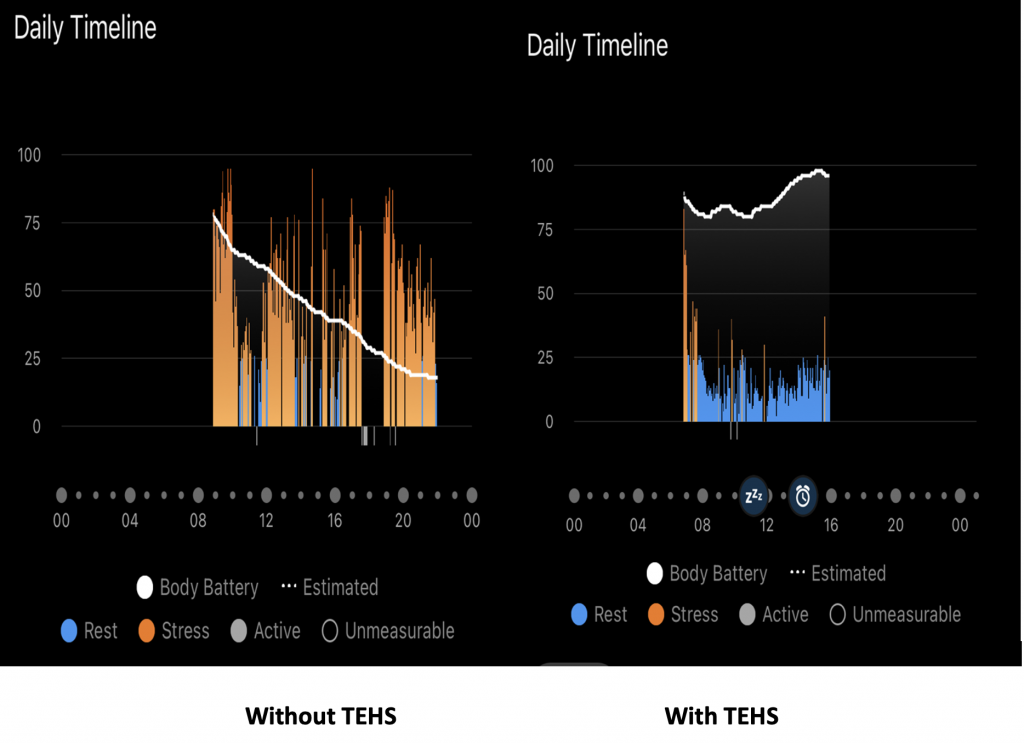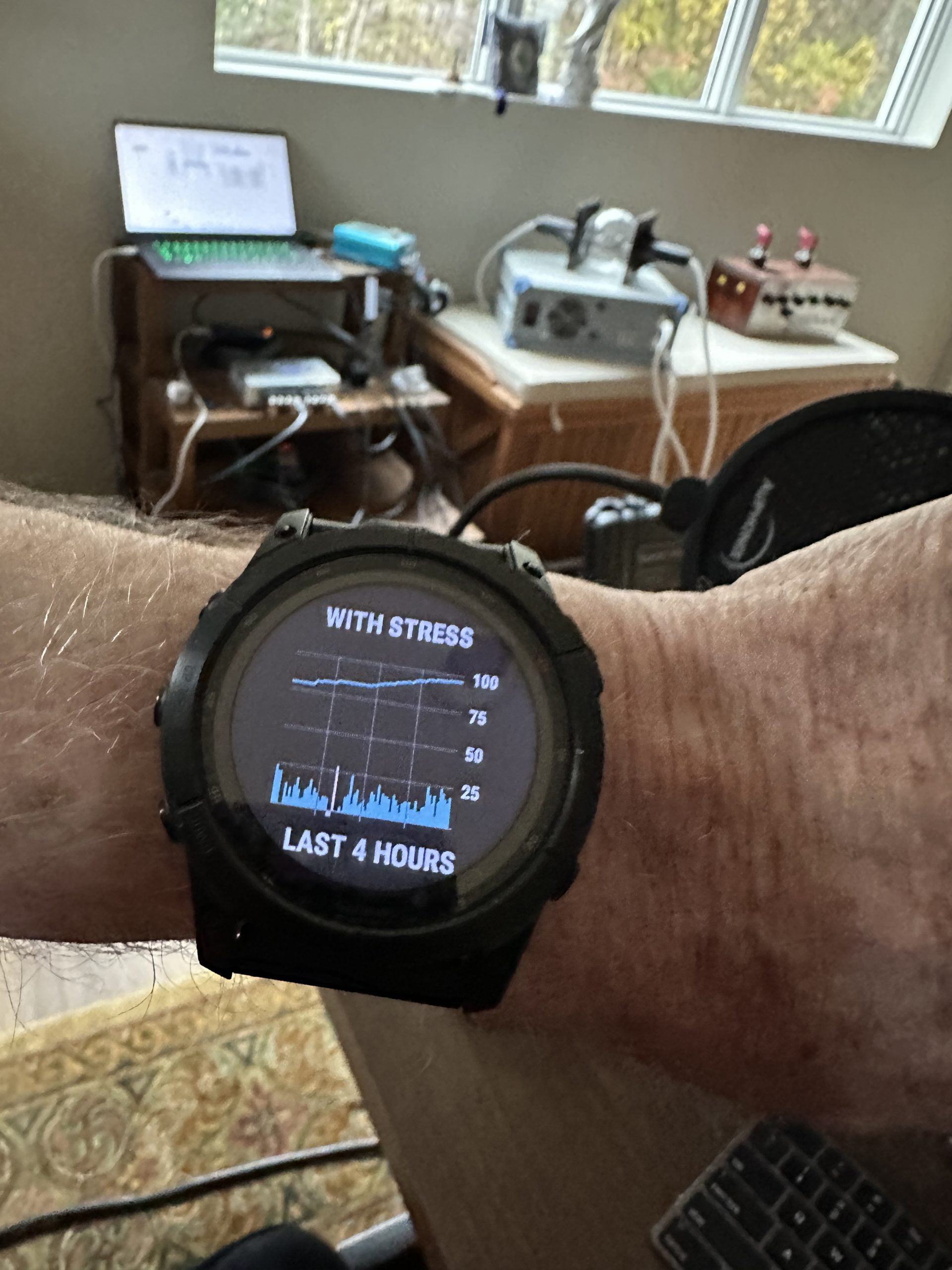Stress is a fact of life that can impact our health and well-being in profound ways. Prolonged stress can lead to various physical and mental health issues, including cardiovascular disease, anxiety, depression, and reduced life expectancy. In contrast, reducing stress and increasing energy levels can promote longevity and a higher quality of life. In this blog post, we will discuss the TEHS framework, which aims to double your energy and halve your stress, as well a new paper’s findings on how reducing stress can improve longevity.
The TEHS Framework: Doubling Your Energy and Halving Your Stress
TEHS uses the Garmin Watch Body Battery data developed by FirstBeat.com to enhance the performance of Olympic athletes. We measure energy levels vs stress levels throughout the day. This gives us biofeedback we can use to increase energy and lower stress to increase health and wellness and improve longevity.

The TEHS framework is designed to help individuals increase their energy levels and reduce their stress to improve their overall well-being. The framework focuses on seven key areas:
- Photoanalysis Remote Rife Clinic Frequencies: to clear allergens, toxins and pathogens while increasing minerals and vitamins and balancing hormones is a critical component for lowering stress.
- Nutrition: Eating a balanced, nutrient-dense diet that supports the body’s functions and promotes overall health.
- Exercise: Developing a personalized exercise routine that focuses on improving cardiovascular fitness, strength, flexibility, and balance.
- Sleep: Emphasizing the importance of quality sleep for physical recovery and mental clarity.
- Stress management: Teaching stress management techniques, such as mindfulness, meditation, or deep-breathing exercises, which can help people become more aware of their stressors and learn how to cope with them effectively.
- Mental health: Encouraging individuals to seek professional help if needed and maintain a strong support system to ensure mental well-being.
- Time management and work-life balance: Assisting individuals in setting realistic goals, prioritizing tasks, and developing a healthy work-life balance to minimize burnout and increase overall satisfaction and energy levels.
By incorporating these aspects into the TEHS framework, individuals can increase their energy levels, reduce their stress, improve their overall well-being, and extend their healthspan.
Reduced Stress Improves Longevity: Insights from Cell Metabolism
A recent study published in the journal Cell Metabolism found that reducing stress can improve longevity. The study, which used a mouse model, showed that mice with reduced levels of the stress hormone cortisol lived longer than those with higher levels of cortisol. Additionally, the study found that the mice with reduced cortisol levels had fewer age-related diseases and a better quality of life.
These findings suggest that reducing stress levels can have a significant impact on our health and longevity. While the study was conducted on mice, its implications for human health are significant.
Reducing stress can help individuals reduce the risk of various chronic diseases, including cardiovascular disease, diabetes, and cancer. Stress can also impact our mental health, leading to anxiety, depression, and other mental health issues.
Conclusion
The TEHS framework provides a comprehensive approach to improving energy levels and reducing stress. By focusing on nutrition, exercise, sleep, stress management, mental health, and work-life balance, individuals can improve their overall well-being and quality of life. Additionally, the paper’s findings highlight the importance of reducing stress levels for promoting longevity and a better quality of life. By incorporating the TEHS framework into our daily lives, we can take control of our health and achieve a long and fulfilling life.
References
- Gladyshev, V. N., & Gorbunova, V. (2020). Stress and aging: a new paradigm. Cell, 181(2), 283-298.
- Ferrucci, L., Fabbri, L., & Ventura, M. (2020). Stress and aging: from molecular mechanisms to clinical implications. Nature Medicine, 26(11), 1637-1648.
- McEwen, B. S. (2020). The neuroepigenetics of stress and aging. Nature Neuroscience, 23(1), 11-19.
- Lupien, S. J., McEwen, B. S., Gunnar, M. R., & Heim, C. (2009). Effects of stress on brain structure and function. Annual Review of Neuroscience, 32, 71-95.
- Sapolsky, R. M. (2004). Why zebras don’t get ulcers: a guide to stress, stress-related diseases, and coping. New York: W. H. Freeman.
